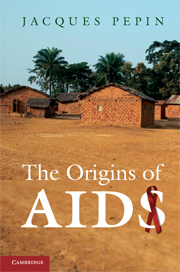Book contents
- Frontmatter
- Contents
- Figures, maps and table
- Acknowledgements
- Abbreviations
- Note on terminology
- Introduction
- 1 Out of Africa
- 2 The source
- 3 The timing
- 4 The cut hunter
- 5 Societies in transition
- 6 The oldest trade
- 7 Injections and the transmission of viruses
- 8 The legacies of colonial medicine I
- 9 The legacies of colonial medicine II
- 10 The other human immunodeficiency viruses
- 11 From the Congo to the Caribbean
- 12 The blood trade
- 13 The globalisation
- 14 Assembling the puzzle
- 15 Epilogue
- References
- Appendix Classification of retroviruses
- Index
9 - The legacies of colonial medicine II
the Belgian Congo
Published online by Cambridge University Press: 05 June 2012
- Frontmatter
- Contents
- Figures, maps and table
- Acknowledgements
- Abbreviations
- Note on terminology
- Introduction
- 1 Out of Africa
- 2 The source
- 3 The timing
- 4 The cut hunter
- 5 Societies in transition
- 6 The oldest trade
- 7 Injections and the transmission of viruses
- 8 The legacies of colonial medicine I
- 9 The legacies of colonial medicine II
- 10 The other human immunodeficiency viruses
- 11 From the Congo to the Caribbean
- 12 The blood trade
- 13 The globalisation
- 14 Assembling the puzzle
- 15 Epilogue
- References
- Appendix Classification of retroviruses
- Index
Summary
While France was busy running the health systems of more than twenty-five territories in Africa, around the Indian Ocean, in south-east Asia and the Americas, Belgium could concentrate its efforts on its three African colonies, the largest of which by far was the Belgian Congo. Belgium was justifiably proud of its achievements in the Congo, whose health system soon acquired the reputation of being the best in tropical Africa. This led to a substantial improvement in the health of the Congolese people, but also to numerous opportunities for the transmission of blood-borne microbial agents. What happened in and around Léopoldville will be especially relevant, as this is the area where ultimately HIV-1 spread and diversified.
For this part of the story, the best sources of information are in Belgium. Since 1960 the ministry of foreign affairs has kept the archives of the Belgian Congo, which are accessible to researchers. The Royal Library and the university libraries of Brussels, Louvain and Louvain-la-Neuve hold impressive collections of books and journals relating to the country’s former colonies. In Antwerp, the tropical medicine institute has made available online the Annales de la Société Belge de Médecine Tropicale, in which Belgian medical officers working in the tropics used to publish their findings. More detailed articles were published through the Académie Royale des Sciences Coloniales.
- Type
- Chapter
- Information
- The Origins of AIDS , pp. 143 - 167Publisher: Cambridge University PressPrint publication year: 2011



